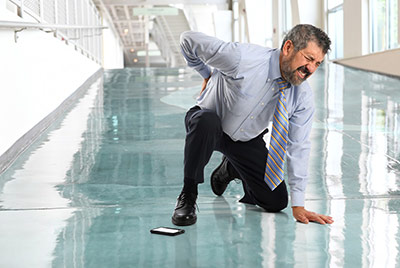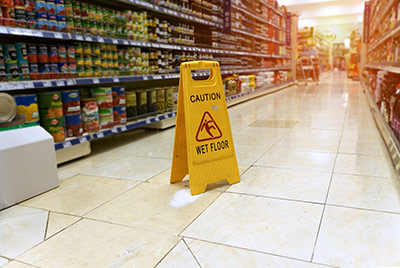New Jersey Slip and Fall Lawyers
What to Do After a Slip and Fall Injury in New Jersey
 If you’ve been hurt in a slip and fall accident in New Jersey, you may likely be able to recover a monetary award or settlement if the injury was someone else’s fault. However, the process of filing a claim can be complex and overwhelming. And when you’re already dealing with doctor’s visit, time off work, and medical bills, the last thing you want to worry about is figuring out how to file a claim. A law firm with premises liability attorneys experienced in slip and fall cases can help you better understand your potential claims and advise you on your next steps.
If you’ve been hurt in a slip and fall accident in New Jersey, you may likely be able to recover a monetary award or settlement if the injury was someone else’s fault. However, the process of filing a claim can be complex and overwhelming. And when you’re already dealing with doctor’s visit, time off work, and medical bills, the last thing you want to worry about is figuring out how to file a claim. A law firm with premises liability attorneys experienced in slip and fall cases can help you better understand your potential claims and advise you on your next steps.
What is a “Slip and Fall” claim?
“Slip and Fall” is just a shorthand term for premises liability situation where you are injured on someone else’s property and want to file a legal claim to hold them and other negligent parties responsible. can cover a range of different situations, including injury, or even death, caused by:
- Uneven pavement or sidewalks
- Wet or icy exterior walkways
- Wet or slippery interior floors
- Insufficient hazard warnings (such as “wet floor” signs)
- Poor lighting
- Damaged flooring (such as rips in a carpet)
- Obstructions or debris on floors or sidewalks
- Lack of handrails on staircases
These are just some examples, but not an exhaustive list, of situations where you might have a possible slip and fall claim. You may have a potential slip and fall claim even if it isn’t on this list.
What types of compensation can I receive for my slip and fall injury?
 If you are successful in proving your New Jersey slip and fall claim, you may be able to recover losses and damages for the following:
If you are successful in proving your New Jersey slip and fall claim, you may be able to recover losses and damages for the following:
- Pain and suffering
- Permanent injuries that impact your normal daily activities
- Scarring and/or disfigurement
- Lost wages
- Personal property damaged as a result of the incident (i.e. broken dentures or glasses)
- Wrongful death
What do I have to prove to recover for my slip and fall injury in New Jersey?
To prove your New Jersey slip and fall claim, you will have to show that the property owner or responsible party was careless, negligent, or otherwise not reasonably responsible in maintaining and monitoring the property on which you sustained your injury. Or, you can also show that the property owners already knew of the hazards that caused your accident, but they failed to correct them in time to prevent your injury. You will also have to prove what types of injuries and damages you sustained by producing evidence like:
- Medical bills
- Medical examination findings and expert testimony from a doctor
- Documentation of time missed from work,
- Testimony from you and/or your family and friends about how the injury has affected your ability to carry on a normal life
Even if you are able to prove your claim, the laws in New Jersey also allow the defendant, or the party you are suing, to reduce their liability by proving that the accident was partially caused by your own negligence; this is called contributory negligence. There’s also a statute of limitations, or time limit, for when you can file your slip and fall claim in New Jersey.
How do I file a claim or lawsuit for a slip and fall injury in New Jersey?
Filing a slip and fall claim in New Jersey is a complicated process. That’s why it’s important to hire a law firm with experienced and trustworthy attorneys who can help you prove your claim, make sure you file it in time, and defend you against claims of contributory negligence so you can get the full compensation you deserve for your injury.
At Keefe Law Firm, our dedicated team of lawyers has recovered billions of dollars for our clients for their personal injury claims. And because our firm is known for our strong litigation practice (i.e. trying cases in court), we are prepared to take your case as far as we have to to get you the settlement or award you deserve.
If you or a loved one has sustained injuries from a slip and fall, let our team of experienced personal injury lawyers help. We can meet with you to discuss your potential claim at no cost, no obligation, and everything will be kept private and confidential. Additionally, we operate on a contingency fee basis, which means that you don’t pay anything up front or during the handling of your case. When your case settles, legal fees are deducted from the insurance settlement or trial award. Your Keefe Law Firm personal injury attorney will explain this to you and will also provide it to you in writing before beginning any work on your case.
What can I do to help my case?
After a suspected slip and fall injury, do these five things to help your case:
- Give your doctor or healthcare provider complete and accurate information about your injuries and any other negative physical, mental or emotional symptoms you are experiencing. Your medical records are one of the most important pieces of evidence in your case. Healthcare providers are required to keep accurate and detailed records of your complaints, injuries and illness. Their diagnosis and the treatment plan to care for you after the accident. This includes a description of your accident and how you were injured. Often, in the eyes of the judge or jury or insurance companies, if it is not in your medical records, it did not happen.
- Follow doctors’ orders to a “T”. Not doing everything your physician and other healthcare providers prescribe can really harm your case–reducing the amount of compensation. Defendants and insurance companies use anything and everything they can against plaintiffs.
- Document your injuries in writing: Write everything down as soon as you are able immediately after your injury and up until your case settles. Record how you are feeling daily, including how your injuries have affected your personal life, employment, and hobbies. Store this documentation electronically by simply emailing it to yourself. This information can help increase the value of your case when it comes time to explain how the accident affected your daily life.
- Document Your Lost Wages and Income: Keep a written record of missed work and lost wages due to recovery, doctors’ appointments, physical therapy, etc.
- Keep Track of Medical Bills and Expenses: After an accident you will receive “explanation of benefits” forms from your health insurance company. It is important that you read and note these forms; often after an accident your insurer will deny payment until you provide information about how you were injured. If your medical bills are turned over to a collection agency your credit score will suffer. Also, medical providers have contracts with your health insurance provider in which they agree to receive an amount of money less than what they charge for payment in full. This means that if your medical bills are not fully paid by your insurance, you will have to pay the difference out of pocket.
Get A Free Case Evaluation
At Keefe Law Firm, we stand for our injured clients to attain nothing less than the compensation they deserve. Talk to a lawyer today about your options.
